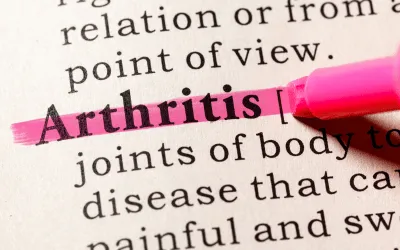About Arthritis
As the nation’s #1 cause of disability, arthritis affects nearly 60 million adults and 300,000 children. Over 100 types of arthritis and related conditions damage the joints and often other organs.
How can we assist you?
Helpful Tools for You

Exploring the Role of Genetics in Arthritis: Can It Be Inherited?
Genetics plays a significant role in the development of arthritis. Certain types of arthritis, such as rheumatoid arthritis and ankylosing spondylitis, have a strong genetic component. Variations in specific genes can increase the risk of developing these conditions. However, it is important to note that genetics alone is not the sole determinant of arthritis. Environmental factors, such as infections and lifestyle choices, also contribute to its development. Inherited forms of arthritis, where the condition runs in families, provide further evidence of the genetic influence. Understanding the role of genetics in arthritis sets the stage for discussing the inheritance aspect, and exploring how certain forms of arthritis can be passed down from generation to generation.
Variations in specific genes, such as HLA-DRB1 for rheumatoid arthritis and HLA-B27 for ankylosing spondylitis, increase the risk of developing these conditions. Genetic factors involved in immune system function, inflammation, and joint structure can also contribute to arthritis development. However, genetics alone does not determine arthritis onset; environmental factors and lifestyle choices also play a role. The interplay between genetics and environmental factors highlights the complex nature of arthritis development.
.
Genetic Factors in Arthritis
Several genes and genetic markers are associated with different forms of arthritis. Variations in these genes, such as HLA-DRB1 for rheumatoid arthritis and HLA-B27 for ankylosing spondylitis, increase the susceptibility to developing arthritis. Other genes, including COL2A1 and PTPN22, also play a role in arthritis development. These variations can affect immune responses, inflammation, and cartilage structure, contributing to disease onset. However, genetics alone does not determine arthritis development, as environmental factors and gene-environment interactions also play a role.
Inherited forms of arthritis, such as Familial Mediterranean Fever (FMF) and Hereditary Osteoarthritis (HOA), provide valuable insights into the genetic basis of these conditions. Let's explore each of these inherited forms in detail:
Familial Mediterranean Fever (FMF):
Characteristics: FMF is an autoinflammatory disorder characterized by recurrent episodes of fever, abdominal pain, chest pain, and joint inflammation. Other symptoms may include skin rashes and inflammation of the serous membranes lining the abdomen, lungs, and heart.
Inheritance Pattern: FMF is inherited in an autosomal recessive manner, meaning that both copies of the affected gene, called MEFV, must be mutated for the condition to manifest.
Known Genetic Mutations: The majority of FMF cases are caused by variations in the MEFV gene, which encodes the pyrin protein. Specific variations in MEFV, such as M694V, M680I, V726A, and E148Q, are associated with increased FMF susceptibility.
Hereditary Osteoarthritis (HOA):
Characteristics: HOA is a type of osteoarthritis (OA) that runs in families and often affects multiple joints. It typically manifests earlier in life compared to non-hereditary forms of OA and may be associated with skeletal abnormalities.
Inheritance Pattern: HOA can be inherited in either an autosomal dominant or autosomal recessive manner, depending on the specific genetic mutation involved.
Known Genetic Mutations: Several genes have been implicated in HOA. For example, variations in the COL2A1 gene, which encodes the type II collagen protein found in cartilage, have been associated with HOA. Mutations in other genes, such as COMP, MATN3, and DTDST, have also been linked to specific forms of hereditary OA.
It's important to note that these inherited forms of arthritis represent a small subset of the overall arthritis population. Most cases of arthritis, including rheumatoid arthritis and osteoarthritis, have complex genetic and environmental influences. Inherited forms provide valuable insights into specific genetic mechanisms but may not fully capture the overall complexity of arthritis development.
Genetic testing and counseling are essential for individuals with a family history of inherited forms of arthritis. These services can help identify specific genetic mutations, assess the risk of disease transmission, and provide guidance for management and treatment options. Consulting with healthcare professionals knowledgeable in genetics and rheumatology is crucial for a comprehensive approach to inherited forms of arthritis.
Complex Interaction of Genetics and Environment
Arthritis development is a complex process influenced by a combination of genetic predisposition and environmental factors. While genetics play a role in determining susceptibility to arthritis, environmental factors can interact with genetic factors to influence disease onset and progression. Here's a closer look at how lifestyle, diet, and environmental exposures can interact with genetic factors in arthritis development:
Lifestyle Factors: Lifestyle choices, such as physical activity levels, smoking, and stress management, can interact with genetic factors to impact arthritis risk. For example, individuals with a genetic predisposition to arthritis may have a higher risk of developing the condition if they lead a sedentary lifestyle or engage in behaviors that promote inflammation, like smoking.
Dietary Factors: Diet plays a significant role in arthritis development. Certain foods, such as those high in saturated fats and processed sugars, can contribute to inflammation and increase arthritis risk, especially in individuals with genetic susceptibility. Conversely, a healthy diet rich in fruits, vegetables, whole grains, and omega-3 fatty acids can help reduce inflammation and promote joint health.
Environmental Exposures: Environmental factors, including exposure to certain chemicals, pollutants, and infections, can trigger or exacerbate arthritis in genetically susceptible individuals. For example, exposure to cigarette smoke, air pollution, or workplace toxins can interact with genetic factors to increase the risk of developing certain forms of arthritis.
Gene-Environment Interactions: The interplay between genes and the environment is a key factor in arthritis development. Genetic variations can modify how individuals respond to environmental triggers. For instance, a specific genetic variant may increase susceptibility to arthritis only when an individual is exposed to certain environmental factors, such as a viral infection or specific dietary components.
Understanding the complex nature of arthritis development involves recognizing the dynamic interaction between genetic factors and environmental influences. Genetic predisposition alone is not sufficient to cause arthritis, as environmental factors and lifestyle choices play critical roles in determining disease outcomes. By adopting a healthy lifestyle, making informed dietary choices, and minimizing exposure to harmful environmental factors, individuals can optimize their overall health and potentially reduce the impact of genetic factors on arthritis development.

Genetic Testing for Arthritis: Potential Benefits and Limitations
Genetic testing for arthritis involves analyzing an individual's DNA to identify specific genetic variations associated with the condition. Here's an introduction to genetic testing and its potential benefits and limitations:
Benefits of Genetic Testing:
Confirmation of Diagnosis: Genetic testing can confirm a suspected genetic form of arthritis, especially in cases where the clinical presentation is atypical or when multiple family members are affected.
Predictive Testing: Genetic testing can determine an individual's risk of developing certain forms of arthritis, particularly when there is a known family history of the condition. This information can guide early intervention and preventive measures.
Personalized Treatment Approach: Genetic test results can help healthcare professionals tailor treatment plans based on an individual's genetic profile, optimizing medication choices and treatment strategies.
Family Planning: Genetic testing can inform family planning decisions, allowing individuals to assess the risk of passing on genetic forms of arthritis to their children and consider options like preimplantation genetic diagnosis or prenatal testing.
Limitations of Genetic Testing:
Incomplete Understanding: Our current understanding of the genetic basis of arthritis is still evolving. Genetic testing may not identify all possible genetic variations associated with the condition, and negative test results do not necessarily rule out the possibility of developing arthritis.
The complexity of Disease: Arthritis is a complex condition influenced by multiple genetic and environmental factors. Genetic testing provides insights into genetic predispositions, but it cannot predict disease onset, severity, or the influence of environmental triggers.
Ethical Considerations: Genetic testing may reveal unexpected or uncertain results, leading to emotional and psychological implications for individuals and their families. It is important to consider potential psychological and social implications before pursuing genetic testing.
Genetic Counseling Services
Genetic counseling is an invaluable service that provides guidance and support to individuals with a family history of arthritis. Here's an introduction to genetic counseling and its role in helping individuals navigate the genetic aspects of arthritis:
Genetic counseling is a process that involves discussing the potential implications of genetic testing, providing education about inheritance patterns and risk assessment, and offering emotional support. Genetic counselors are trained professionals who specialize in genetics and counseling techniques.
In the context of arthritis, genetic counselors can:
Assess Risk: Genetic counselors evaluate an individual's family history, personal medical history, and specific genetic tests, if available, to assess the risk of developing genetic forms of arthritis.
Provide Education: Genetic counselors explain the inheritance patterns, genetic factors, and associated risks to individuals and their families. They help interpret genetic test results and provide information on the likelihood of passing on the condition.
Offer Emotional Support: Genetic counselors understand the emotional impact of genetic testing and can provide empathetic support, helping individuals process the information, cope with any concerns or uncertainties, and make informed decisions.
Discuss Management Options: Genetic counselors can discuss available management and treatment options, connect individuals with appropriate healthcare providers, and facilitate ongoing care coordination.
Genetic counseling empowers individuals to make informed decisions about genetic testing, family planning, and personal health management. By working with genetic counselors, individuals can better understand the genetic aspects of arthritis, receive personalized guidance, and gain support throughout their journey with the condition.
Managing Genetic Risk and Preventive Measures
For individuals with a genetic predisposition to arthritis, here are some tips to manage their risk and reduce the impact of genetic factors:
Maintain a healthy weight and engage in regular exercise.
Focus on an anti-inflammatory diet rich in fruits, vegetables, and whole grains.
Practice stress-management techniques to reduce inflammation.
Protect your joints by using proper body mechanics and ergonomic tools.
Avoid tobacco and limit alcohol consumption.
Prioritize quality sleep for overall well-being.
Stay informed and seek professional guidance from healthcare professionals, including rheumatologists and genetic counselors.
Addressing Concerns and Seeking Professional Advice
It is highly encouraged to consult with healthcare professionals, including genetic counselors and rheumatologists, for personalized advice and guidance if you have a genetic predisposition to arthritis. These professionals have the expertise to assess your risk, provide tailored recommendations, and address any concerns you may have.
Additionally, there are resources and support networks available to individuals with genetic predispositions to arthritis. These include:
Genetic Counseling Services: Genetic counselors can provide comprehensive genetic risk assessments, explain test results, and guide you through family planning decisions. They offer emotional support and help you navigate the complexities of genetic factors in arthritis.
Rheumatology Clinics: Rheumatologists specialize in the diagnosis and treatment of arthritis. They can evaluate your symptoms, conduct further testing if needed, and create personalized treatment plans to manage your condition effectively.
Arthritis Organizations: Organizations such as the Arthritis Foundation offer valuable resources, educational materials, and support networks for individuals with arthritis. They provide information on managing symptoms, lifestyle modifications, and advancements in research and treatment options.
Online Communities: Online forums and support groups provide opportunities to connect with others who share similar experiences. These communities offer a platform for exchanging information, sharing coping strategies, and finding emotional support.
Effects of Arthritis

Cause of Disability
In the United States, 23% of all adults, or more than 54 million people, have arthritis. It is a leading cause of work disability, with annual costs for medical care and lost earnings of $303.5 billion.

Workforce Effects
Sixty percent of US adults with arthritis are of working age (18 to 64 years). Arthritis can limit the type of work they are able to do or keep them from working at all.

Global Impact
In fact, 8 million working-age adults report that their ability to work is limited because of their arthritis. For example, they may have a hard time climbing stairs or walking from a parking deck to their workplace.
Promoting Interventions That Reduce Arthritis Pain
American Arthritis Foundation recognizes several proven approaches to reduce arthritis symptoms:
Be active. Physical activity—such as walking, bicycling, and swimming—decreases arthritis pain and improves function, mood, and quality of life. Adults with arthritis should move more and sit less throughout the day. Getting at least 150 minutes of moderate-intensity physical activity each week is recommended.
Protect your joints. People can help prevent osteoarthritis by avoiding activities that are more likely to cause joint injuries.
Talk with a doctor. Recommendations from health care providers can motivate people to be physically active and join a self-management education program. Should your arthritis be interfering with your activities of daily living you may be a candidate to receive many new treatments, and learn how to reverse the arthritis condition.
Have a question?
We're Here to Help
By providing my phone number, I agree to receive text messages from the business.


